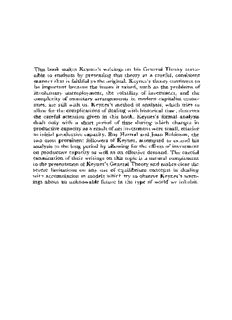
Keynes's General Theory and Accumulation (Modern Cambridge Economics) PDF
Preview Keynes's General Theory and Accumulation (Modern Cambridge Economics)
This book makes Keynes's writings on his General Theory acces- sible to students by presenting this theory in a careful, consistent manner that is faithful to the original. Keynes's theory continues to be important because the issues it raised, such as the problems of involuntary unemployment, the volatility of investment, and the complexity of monetary arrangements in modern capitalist econo- mies, are still with us. Keynes's method of analysis, which tries to allow for the complications of dealing with historical time, deserves the careful attention given in this book. Keynes's formal analysis dealt only with a short period of time during which changes in productive capacity as a result of net investment were small, relative to initial productive capacity. Roy Harrod and Joan Robinson, the two most prominent followers of Keynes, attempted to extend his analysis to the long period by allowing for the effects of investment on productive capacity as well as on effective demand. The careful examination of their writings on this topic is a natural complement to the presentation of Keynes's General Theory and makes clear the severe limitations on any use of equilibrium concepts in dealing with accumulation in models which try to observe Keynes's warn- ings about an unknowable future in the type of world we inhabit. MODERN CAMBRIDGE ECONOMICS KEYNES'S GENERAL THEORY AND ACCUMULATION MODERN CAMBRIDGE ECONOMICS General Editors: Phyllis Deane Geoffrey Harcourt Jan Kregel This series has been relaunched under a new editorial board. It will continue its original aim of analysing contemporary economic prob- lems by exploring a broad range of alternative approaches to mainstream economics. Its authors will publish in the best tradition of the modern Cambridge school, which derives its inspiration from Keynes himself and from the work of his immediate successors. Aimed primarily at an undergraduate audience, the series will act as a forum for innovative work from a wide variety of standpoints that are generally critical of conventional theoretical approaches. Phyllis Deane The Evolution of Economic Ideas Joan Robinson Aspects of Development and Underdevelopment A. K. Bagchi The Political Economy of Underdevelopment fiprime Eshag Fiscal and Monetary Policies and Problems in Developing Countries Michael Ellman Socialist Planning (2nd Edition) Colin Rogers Money, Interest and Capital KEYNES'S GENERAL THEORY AND ACCUMULATION A. Asimakopulos McGill University [CAMBRIDGE UNIVERSITY PRESS Published by the Press Syndicate of the University of Cambridge The Pitt Building, Trumpington Street, Cambridge CB2 1RP 40 West 20th Street, New York, NY 10011-4211 USA 10 Stamford Road, Oakleigh, Melbourne 3166, Australia © Athanasios Asimakopulos 1991 First published 1991 Reprinted 1993, 1995 British Library cataloguing in publication data Asimakopulos, Athanasios 1930- Keynes's general theory and accumulation. - Modern Cambridge economics). 1. Economics. Keynes, John Maynard, 1883-1946. General theory of employment, interest and money 1. Title 33OI56 Library of Congress cataloguing in publication data Asimakopulos, A., 1930- Keynes's General theory and accumulation / A. Asimakopulos. p. cm. - (Modern Cambridge economics) Includes bibliographical references and index. ISBN o 521 36248 2. - ISBN o 521 36815 4 (pbk.) 1. Keynes, John Maynard, 1883-1946. General theory of employment, interest, and money. 2. Keynesian economics. 1. Title. 11. Series. HB99.7.K38A85 1991 33o.i5'6-dc20 90-41557 CIP ISBN o 521 36248 2 hardback ISBN o 521 36815 4 paperback Transferred to digital printing 2004 To my wife, Marika CONTENTS Series preface page xiii Preface xv Introduction i . i The relevance of the General Theory i .2 The General Theory and historical time 2 .3 The General Theory and equilibrium 4 .4 Short-period equilibrium and change 7 . 5 The growth of the economy over time 9 2 Towards The General Theory 11 2.1 Introduction 11 2.2 The transition from the Treatise 13 2.3 The'Circus' 16 2.4 Drafts of The General Theory 19 2.5 Conclusion 23 3 The General Theory of employment 25 3.1 Introduction 25 3.2 The labour market 27 3.3 Involuntary unemployment 32 3.4 Expectations, time and realised results 38 3.5 Effective demand 41 3.6 The stability of equilibrium 46 3.7 Say's law 49 3.8 Long-period employment 50 3.9 Conclusion 51 Appendix 53 4 Consumption and investment 58 4.1 Introduction 58 4.2 The consumption function 59 4.3 The multiplier 65 Contents 44 The marginal efficiency of capital 70 4-5 Investment decisions, investment and time 77 .6 The volatility of investment 80 4 4-7 Conclusion 82 Money, finance and the rate of interest 5 85 5-1 Introduction 85 5-2 The demand for money 87 5-3 The classical theory of interest 96 5-4 The 'safe' rate of interest 99 5-5 The rate of interest and employment 101 5-6 The essential properties of interest and money 102 5-7 Finance 109 5-8 A revolving fund of liquid finance 112 5-9 The term structure of interest rates IJ5 5.io Conclusion "7 6 Equilibrium, change and time 120 6.i Introduction 120 6.2 Independent variables and changes 122 6-3 Changes in money-wage rates 124 6. Equilibrium in a changing environment 128 4 6-5 The trade cycle 131 6.6 Long-period equilibrium in The General Theory i34 6. Conclusion 136 7 7 Harrod and dynamic economics 138 7.i Introduction 138 7-2 The trade cycle 139 7-3 Transition to the 1939 'Essay' 144 7-4 Dynamic equilibrium 145 7-5 The line of steady advance 151 .6 The instability principle 159 7 7-7 Conclusion 164 8 Robinson on the accumulation of capital 166 8.i Introduction 166 8.2 The determinants of the system 168 8-3 Short-period equilibrium 172 8. The desired rate of accumulation 175 4 8-5 Golden, and not so golden, growth paths 179 8.6 Instabilitv 18*
Description: